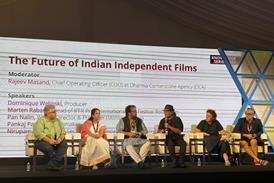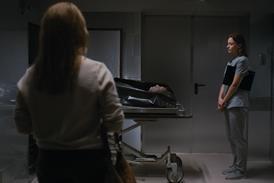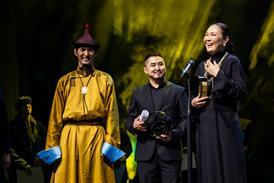Dir: Wayne Wang. US. 2007. 83mins.
After a series of Hollywood assignments, the eclectic and unpredictable Wayne Wang has fashioned an old fashioned classical piece in A Thousand Years of Good Prayers, written by the highly regarded Chinese writer Yiyun Li, who adapted her own short story. The minor key and quietly observational work is not earth-shattering or particularly urgent, though it enables a talented filmmaker to work through personal ideas about assimilation and family conflict in an open, smart and gracious way.
Wang also shot the companion piece, The Princess of Nebraska, also taken from a Yiyun Li short story. In theme and outline, Thousand Years poaches on the themes of the great Japanese master Yasujiro Ozu (Tokyo Story, Late Spring), where family relationships and tense family reconciliations are turned into a meditation on loss and regret.
The director's name and recognition are the primary selling point for this largely Mandarin-language work whose greatest exposure is likely to be found on the international festival circuit and upscale, niche programming. The film has its European premiere at San Sebastian. Ancillary markets, particularly DVD, are the film's strongest revenue in the US and internationally.
The story is deceptively straightforward. Mr. Shi (Henry O), a retired widower, arrives in Spokane, Washington to visit his daughter, Yilan (Faye Yu), who has been living in America the past 12 years and working as a university librarian. A fanciful dreamer who cajoles strangers with tales of his life as a 'rocket scientist,' Shi is a quiet, taciturn man who is clearly made uneasy by the emotional and professional direction of his daughter's life. She is divorced and living alone in a leafy, soulless modern apartment complex.
The movie's drama and conflict develops out of their inability to understand the other, and Shi's determination to discover the exact reasons for the unraveling of his daughter's marriage.
At the start, the movie's tone is uncertain and repetitive. The less interesting early parts tracking Shi's bemusement at the nature and customs of Western life is too deflating and uninvolved, and lacks any significant revelations or insights. The details are particularly sketchy and unconvincing, for example there is a neighboring blonde who professes to be a forensic scientist or a building manager who claims to have previously been in the employ of the CIA. Shi wanders the surrounding park and develops a tenuous friendship with an Iranian emigre (Ghahremani).
The movie gains interest and excitement in the second half as the father's sense of disappointment is made acute by the revelation that the break up of Yilan's marriage was occasioned by her affair with a Russian professor (Lychnikoff). It produces the most exquisite and sustained interaction between the father and daughter where Shi's own selfish actions and questionable past behavior are contrasted and played out against Yilan's similar indiscretions.
The confrontation gains an unmistakable political connotation as Wang and Yiyun Li link family dissolution to the larger historical tragedies of modern Chinese history entwining the civil war and the Cultural Revolution. Mr. Shi's story of his own crippling loss of identity at the hands of communist party functionaries has a spare power and poetic intensity.
Wang is far more interesting and penetrating in his visual ideas, such as the quietly serene and potent shots of Shi standing in silhouette inside the apartment, looking out at the autumn light. Patrick Lindenmaier's cinematography persuasively expresses the loneliness and dislocation of a man trapped in time and space, concluding the work on a jolt and edge.
Director
Wayne Wang
Production company
North by Northwest (US)
Sales agent
The Match Factory (Ger)
Executive producers
Yasushi Kotani
Taizo Son
Jooick Lee
Producers
Yukie Kito
Rich Cowan
Wayne Wang
Screenplay
Yiyun Li, based on her short story
Editor
Deirdre Slevin
Production designer
Vincent De Felice
Music
Lesley Barber
Cinematography
Patrick Lindenmaier
Cast
Faye Yu
Henry O
Vida Ghahreman
Pasha Lychnikoff
- News
- Reviews
- Features
- Festivals
- Box Office
- Awards
- Stars of Tomorrow
- Subscribe

Subscribe to Screen International
- Monthly print editions
- Awards season weeklies
- Stars of Tomorrow and exclusive supplements
- Over 16 years of archived content




















No comments yet